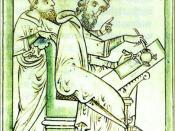The main argument Plato expressed in Phaedo (through Socrates) regarding the Theory of Recollection and his philosophy on the Immortality of the Soul can be explained as follows:
"That our ability to judge objects of experience whether they are more or less perfect *presupposes* that we already have a concept of perfect objects in our minds, Therefore, we cannot gain these concepts of perfect objects from any experience, but had to have them before all experiences. Since our experiences began with our birth, we had to have them before birth. A priori knowledge, which is based on our having these concepts, is prenatal. (Theory of Recollection) Our soul had to have these concepts before birth, so it had to exist before birth. The soul is capable of existing without the body, and so it is immortal."
Socrates discusses in his second speech (245d) "The soul through all her being is immortal, for that which is ever in motion is immortal; but that which moves another and is moved by another, in ceasing to move ceases also to live.
Only the self-moving, never leaving self, never ceases to move, and is the fountain and beginning of motion to all that moves besides."
Socrates goes on to explain how he 'proves' this theory of recollection "But if unbegotten, it must also be indestructible; for if beginning were destroyed, there could be no beginning out of anything, nor anything out of a beginning; and all things must have a beginning. And therefore the self-moving is the beginning of motion; and this can neither be destroyed nor begotten, else the whole heavens and all creation would collapse and stand still, and never again have motion or birth".(245 e)
He further clarifies and then dismisses this point (as proven) as follows "But if...


